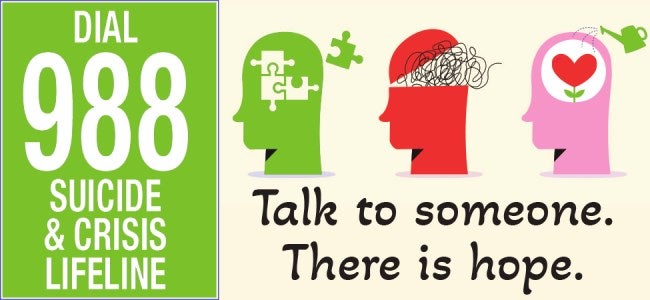Mental Health Month: Psychiatrist shares tips on mental illness
Published 3:00 pm Monday, May 6, 2024
May is Mental Health Awareness Month, a time dedicated to raising awareness and reducing the stigma surrounding mental health issues. This month serves as an opportunity to educate the public about the importance of mental health and the resources available for those in need.
During Mental Health Awareness Month, various organizations and individuals work to educate the public about mental health and advocate for access to resources and services.
The goal of Mental Health Awareness Month is to encourage open discussions about mental health, and promote mental health as an essential aspect of overall well-being. It is an opportunity for individuals to learn more about mental health issues, seek help if needed, and show support for those affected by mental illness.
Psychiatrist Dr. Stuart Larson is a behavioral health physician at Ephraim McDowell Behavioral Health. Larson sees a variety of mental health issues, but explained that the primary issues he deals with are depression and anxiety, a trend that is seen nationwide.
Larson explained much of the stigma around seeking help for mental illness comes from the idea that only a “crazy” person would need to seek professional medical help for a mental illness.
“One thing I encourage people to do is not be afraid to speak up,” Larson said. “There has been a big stigma around mental illness for forever, but most of the people we work with are just normal, everyday people. Depression is a chemical imbalance in the brain. It is not a weakness or character flaw.”
He said that one of the first steps you can take is to speak to your family doctor.
“Family doctors all receive training in psychiatry and some of them are quite good at it,” Larson said. “People shouldn’t be afraid to bring it up to their family doctor. If things don’t work out, they can refer you to us.”

Dr. Stuart Larson
Larson explained that medications used in treatments for mental illnesses are proven and safe. An aspect of using the medicine that can be frustrating is that some of the medicines can require consistent use for over a month before someone can feel their effect.
“It is difficult to be patient when you are depressed,” Larson said. “You take this medicine day after day, after day. You start to wonder when it will finally start working. It is frustrating and difficult, but it will start working eventually. It is not rocket science, it is just brain chemistry and matching the right medications to the right people.”
Larson went on to say that the treatment can be a process, as everybody’s brain is a little different. Two people may require different medicines for the same condition.
Larson thinks it is important to discuss suicide and suicidal thoughts with all his patients.
“Suicide is a permanent solution to a temporary problem,” Larson said. “It destroys the people you leave behind. The first thing I talk about with patients when they come here is to recognize that those thoughts can be normal. You can’t help the thoughts but you need to be able to recognize if it is heading in a bad direction. Don’t be afraid to talk to your loved ones or doctor about it.”
Larson explained that a particularly frustrating issue when dealing with mental health is that many people have uninformed opinions on mental illnesses and treatments.
“You may have to tune out well-meaning friends and family,” Larson said. “It is funny how that doesn’t happen in other medical fields. Nobody will give you their opinion on your heart medication, back surgery, or what you should do with your diabetic medication. But everybody has an opinion on psychiatry. It can get in the way of people seeking treatment, sometimes people feel like they must defend themselves.”
Larson explained that there are many ways outside of using medicine for those struggling with mental illness. Living a healthy lifestyle, exercising regularly, eating healthy, and pursuing hobbies and interests. Talking to a therapist is an extremely effective treatment.
“Take care of your body, you take care of your brain,” Larson said.
Larson went on to say that although healthy lifestyle changes are extremely beneficial, someone still needs to be able to recognize the point at which they need professional help. He explained that a good way to gauge if you need professional help is if your condition is impacting your day-to-day life.
“People probably wait too long to seek help,” Larson said. “There are a lot of reasons why people don’t seek help. There is never a wrong time to seek help, if you feel you are struggling don’t hesitate to speak with your doctor. There is nothing ever wrong with asking for help or seeking an opinion. There is a lot of help out there and I encourage people to not be afraid to get it.”’
Larson encourages people to learn to recognize signs that a loved one is struggling and not be afraid to talk to them.
“It is okay to ask someone if they are okay or suicidal,” Larson said. “You are not going to put those thoughts into their head. People sometimes think, ‘if I ask about it they will go kill themselves.’ That is not how it works. Usually, people want to talk about it if you bring it up.”
Editor’s note: This article is the first in a series of four in recognition of Mental Health Month.







